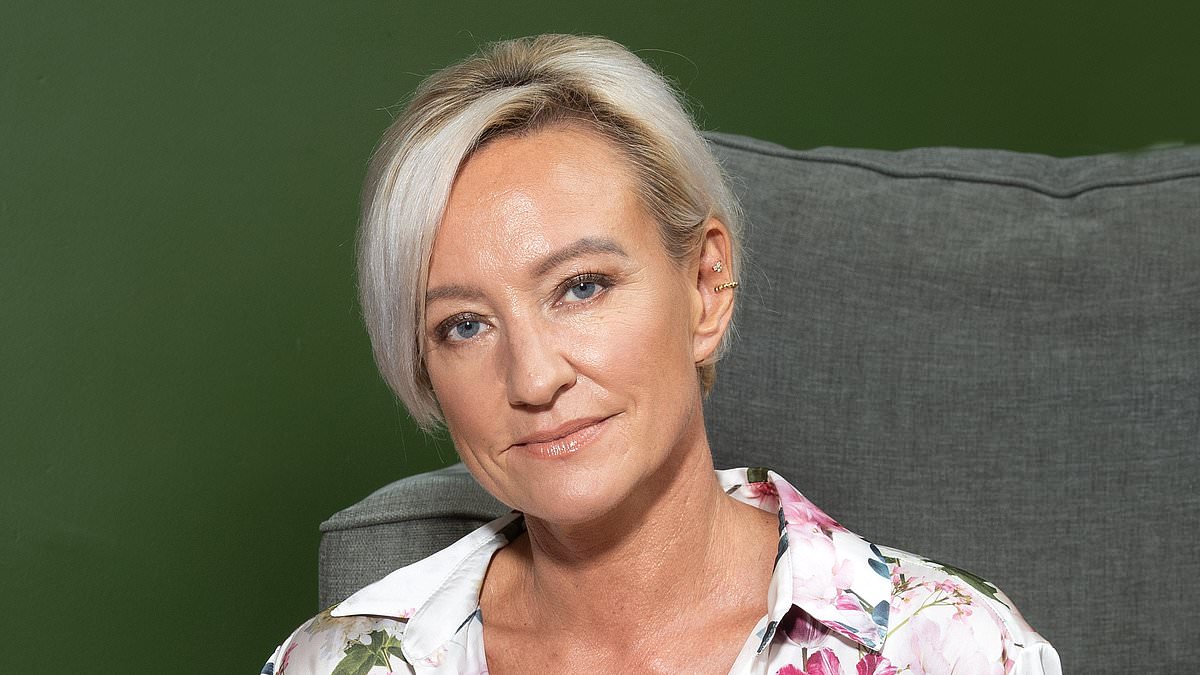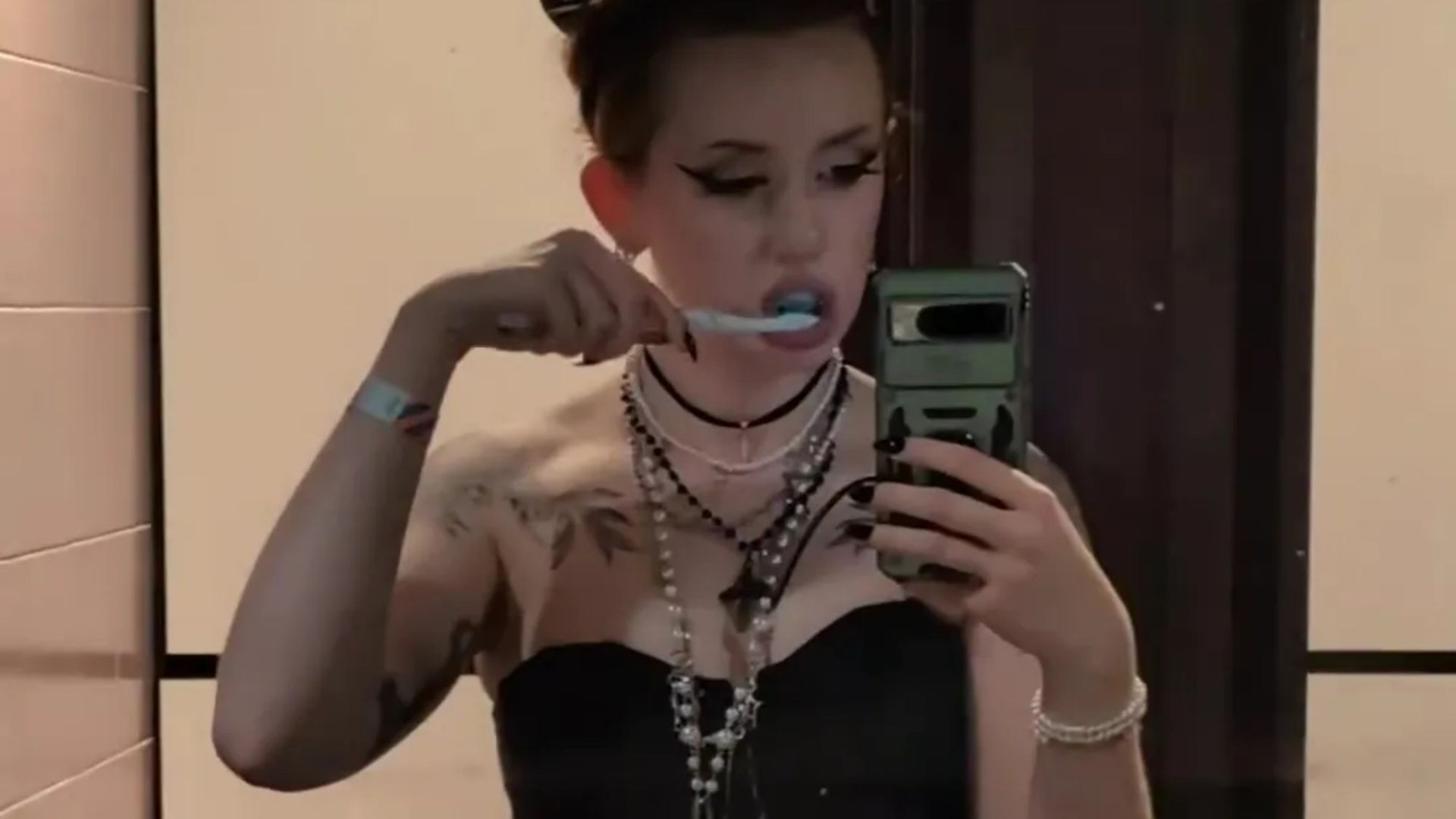The images were sent to ITV weather presenter Ruth Dodsworth by a friend. She clicked on the link to a modelling site and was stunned to see several pictures of her ex-husband – the man she’d last seen in court as he was sentenced to three years’ jail for a decade-long campaign of terror against her – looking very silver fox, very desirable man-about-town. Or, as she puts it, ‘touting himself as some sort of playboy model’. The accompanying biography – in which Jonathan Wignall revealed his ‘likes’ were golf and flying helicopters – confirmed he was available for modelling and acting jobs. The website of Choice Model Management, which was showcasing Wignall’s profile, says it works with trusted broadcasters including the BBC and – yes really – ITV, Ruth’s employer. ‘I couldn’t believe what I was seeing,’ says Ruth, 49. ‘Are no background checks done? What about due diligence? A cursory Google of his name would have revealed that my ex-husband was a dangerous man just out of prison. ‘Helicopters and golf? I’d love to be able to reinvent my life like that, too! Unfortunately, I cannot because I’m just trying to get through each day.’ The Ruth on the TV – an ever-smiling face who will be immediately familiar to viewers in Wales – is usually such a sunny soul, but now she is angry. ‘Yes, my ex-husband is free to move on with his life after leaving prison,’ she says. ‘It’s right that he should and he is doing nothing illegal. But reinventing himself as some sort of glamorous role model? ‘Something sticks in the throat here. It sends a terrible message and reinforces what I’ve always said – this is a man with no remorse, who still doesn’t feel he has done anything wrong. For me, the sense of entitlement that he can just carry on is… galling, to say the least.’ And given the detail of what she endured, who would blame her for being furious? It is five years since the alarm went off about Wignall, 57. For a long time Ruth had kept the dark side of her life – imprisoned in an abusive marriage – not just from viewers, but from those closest to her. Her parents and best friends were unaware that for over a decade she had been living with a man making her life a living hell, controlling every aspect. Ruth’s ‘norm’ was having Wignall stand outside the bathroom while she used the toilet, turning up at her workplace, calling her hundreds of times a day and even placing a tracker on her car so that he would know where she was at every moment. Even while she slept he attempted to control her, lifting her hand and using her fingerprint to open her phone messages. At home in Swansea, Wignall, a former nightclub owner, was physically abusive, prone to lashing out when he’d been drinking. In 2016 he broke several of Ruth’s ribs (she told colleagues she had fallen over the dishwasher) but police only became involved when the couple’s two children – who were used to cowering on the bathroom floor with their mum as their father raged outside the locked door – called her one day and begged her not to come home. ‘Dad will kill you,’ her distraught son Jack, 14, told her. ‘My son saved my life,’ Ruth acknowledges, recalling that Wignall called her 150 times on that day alone, his messages increasingly threatening. It was the catalyst for what she now says she should have done years before: call the police. Coercive control has been an offence since 2015 and Wignall was jailed for three years in 2021 by a judge in Cardiff after he admitted coercive behaviour and stalking. The court heard that far from rejoicing in his wife’s TV success, Wignall was an obsessive husband who would turn up at her broadcast locations and insist that she ate her lunch in the car with him. The judge told Wignall he was a ‘fantasist with a fragile ego’ and an ‘unrepentant possessive bully’ who posed a ‘high risk’ to Ruth. He imposed an indefinite restraining order, meaning that even when freed, Wignall would be banned from going near her or their children. Wignall was released last year. The discovery that he was free to reinvent himself as a kind of James Bond action hero, though, has left Ruth juggling very difficult emotions. Since she expressed concerns, Wignall’s images have been quietly removed from the modelling site but she finds it worrying they were there at all. ‘He’d never done any modelling or acting before,’ she says, baffled. ‘I realise people will say “but he has served his time” and should be free to do whatever he wants, but for him to present himself to the world as a playboy model… I’m sorry, this is so unfair.’ Besides – as with many domestic abuse victims – Ruth is still serving her ‘sentence’. Her ex still has her pictures on his Facebook account, ‘which I find terrifying’, she says, ‘and there is nothing I, or the police, can do about it. He’s doing nothing wrong, apparently. I find it chilling’. She adds: ‘This is what is so hard to process. When you’ve been the victim of abuse, it takes years to come to terms with what has happened and to try to rebuild your life. Some days it feels like I’ve barely begun. I have two children who were witnesses in the trial but who are victims too, and they have been traumatised by what they have been through. We lost our home. We were left penniless. Yet their father is presenting himself as this man that big public brands would want to work with?’ It took huge courage for Ruth to speak out about her ordeal. She gave her first major interview to the Daily Mail after her ex had been jailed and was, she recalls now, ‘such a wreck at the time’. She says: ‘In a way, the speaking out was foisted on me. The trial was public. Like most women in that position, I would have preferred for it not to be out there but even as it was happening, I realised I had to speak up because if it can happen to me, it can happen to anyone.’ I remember her fury and near disbelief back then as she detailed how much of their marriage – they wed in 2002 – had been a ‘sham’. ‘Outwardly, on Instagram, it seemed perfect. I had a beautiful house, a wonderful family. I was this sunny weather presenter but, actually, I was sobbing in make-up before I’d go on air. At the time I didn’t recognise it as domestic abuse but that’s because I knew nothing about the reality of coercive control.’ There had perhaps been fault lines in the marriage for longer but it was when Wignall’s business failed, and Ruth became the breadwinner, that the household dynamics changed. She effectively spent a decade – ‘most of our children’s lives’ – walking on eggshells, accepting that her ‘normal’ was to live in fear for her life. ‘Doing what so many domestic abuse victims do.’ Her children Grace and Jack are now 20, and 19. Grace is about to start her third year at university studying law and, yes, her family’s journey through the criminal justice system has been a factor. ‘She saw so much and I am so proud she wants to use her experience to help others, but I still have mum guilt that I did not get my children out of that toxic, dangerous situation earlier,’ says Ruth. ‘I was so determined that they would not be from a broken home. But everything was broken.’ While her ex was in prison, Ruth continued to speak. She made documentaries about both her own story and the suffering of other abuse victims. She lobbied for change and worked with the police in raising awareness. She has been particularly vocal about how she was left penniless after reporting her husband to the police. She was served with an eviction notice days after his arrest, discovering that the house she thought they owned was just rented – and they were in arrears. ‘He controlled all the finances,’ she says. ‘He took every penny I earned. If I wanted money for lunch, he’d give me £3 for a Tesco meal deal. I covered it up at work. I was embarrassed, ashamed.’ Yet the bigger picture was even more horrific. She discovered there were massive debts – some, she says, taken out in her name. She adds: ‘I have been trying to unravel the mess ever since. Today, I have no assets apart from my pension, nothing to show for the fact that I’ve worked hard, with a good job, for 26 years. ‘My sentence here is continuing. I am so very lucky to have got out of that marriage and to be alive to be able to talk about it, but I cannot reinvent myself. ‘The thought of playing golf and flying helicopters is laughable. My credit rating is in the doldrums. I’m rebuilding things but it has been a complete mess. And even engaging a solicitor is too expensive – £250 an hour.’ In so many ways, Ruth has managed to rebuild her life. She has since remarried (she prefers to say little about her new partner, for his safety) and has continued to work. ‘I have to, and my employers have been so supportive,’ she says. Yet the financial stranglehold is inescapable. ‘I feel very strongly that financial abuse should be taken more seriously by police,’ she says. ‘It’s the thing that’s impossible to escape, even after the perpetrator’s gone to prison.’ Wignall never harmed his children physically but used them as tools in his surveillance of his wife, to the extent of paying them to go through their mum’s phone looking for any incriminating messages. Both children stood with their mother during the trial, and have ever since. Neither wants to have anything to do with their father – something that relieves Ruth and makes her cry. ‘This is not how it should be,’ she says. ‘A parent should not be the subject of a restraining order with regard to their own children.’ When her ex was released from jail, she says it was a ‘hugely difficult time’. She got home security advice and fitted extra locks. She can’t quite answer the question about whether she thinks the prison sentence was too lenient. ‘I don’t know if a longer sentence would have made any difference. My worries revolved around the fact that Jonathan never felt he’d done anything wrong. He’d told police, “But she’s my wife”, as if that excused his behaviour.’ Ruth acknowledges several times that her ex is not doing anything illegal or wrong if he chooses to pursue acting or modelling but the idea of him trying to establish a career in a similar field to hers is upsetting and she says she worries about where he will emerge next. What’s patently clear is that Ruth’s experience raises deeply troubling questions about the long-term consequences for victims of coercive control and that the trauma does not end when a prison sentence is imposed. From where she stands, it seems easier for her tormentor to start a new life than it has been for her. Choice Model Management’s website says it is ‘one of the leading Government-approved employment agencies specialising in editorial, commercial and runway models’. It works ‘closely with our talent and cater to their prospective career whether it be modelling, commercial or extra work in both film and TV’. It says it is ‘fully compliant with HM Government’s Employment Agency Standards inspectorate’. Choice was approached for comment.
Subscribe
Login
0 Comments




